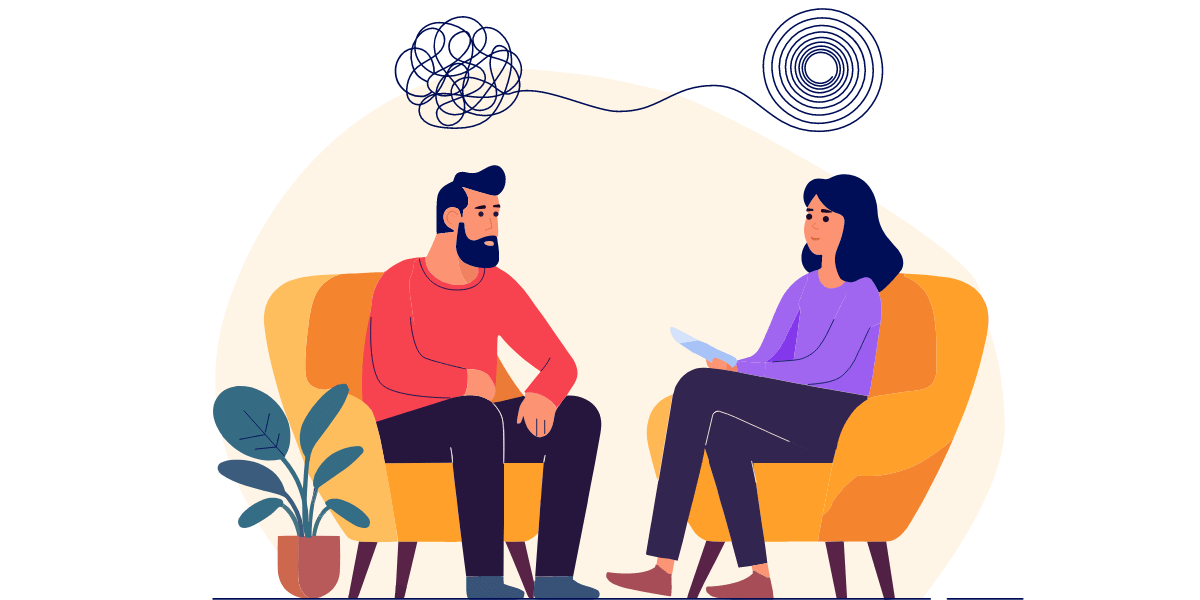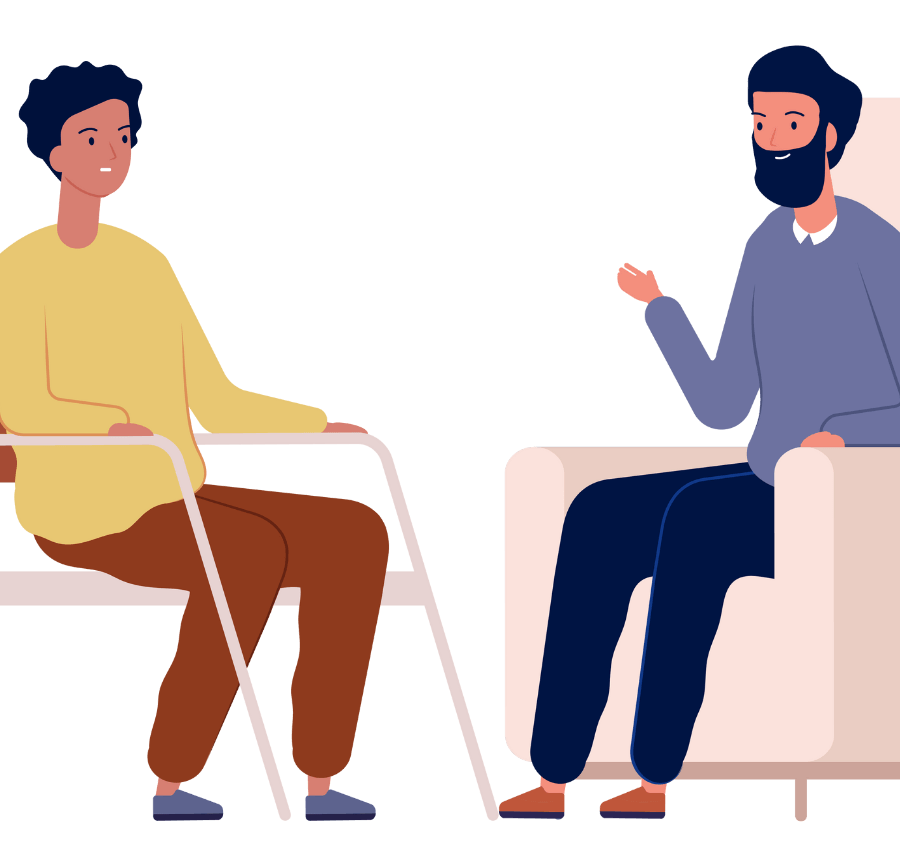How Does Therapy Work?

Learn How Therapy Works
Whether you are considering therapy for the first time or a long time therapy veteran, you may have some questions about what it is, how it works, and what benefits it can offer you. In this page, we will try to answer some of these questions and help you understand how therapy can help you improve your mental health and well-being.
What is therapy?
Therapy, also known as psychotherapy, counseling, or talk therapy, is a process of meeting with a licensed mental health professional who is trained to help you achieve your goals. Most goals are related to feeling well, improving relationships, and recovering from difficult life events – but the goal is completely up to you.
Therapy is not a one-size-fits-all solution. There are different types of therapy, such as cognitive-behavioral therapy, interpersonal therapy, psychodynamic therapy, and more. Each type of therapy has its own goals, methods, and techniques. Some therapies focus on changing your thoughts and behaviors, while others focus on exploring your emotions and relationships. Some therapies are done individually, while others are done in groups or with couples or families.
At Deep Eddy Psychotherapy, we offer a wide range of psychological services, including individual therapy, group therapy, couples counseling, assessments, coaching, and more. We also specialize in treating various issues, such as depression, anxiety, trauma, stress management, relationship problems, self-esteem, and more. We tailor our services to your specific needs and preferences.
How does therapy work?
Therapy helps people heal from emotional pain, achieve personal goals, improve relationships, and grow. Outcomes like these are possible because of the active ingredients of therapy:
The Therapeutic Alliance
This is the quality of the relationship between the therapist and the client, which is based on trust, empathy, collaboration, and mutual understanding. A strong therapeutic alliance can facilitate the client’s engagement, motivation, and adherence to the therapeutic process, and can enhance the client’s sense of self-efficacy, hope, and positive change. Time and time again, therapy research has found that the therapeutic alliance is one of the strongest predictors of outcomes in treatment.
Established Goals with Accountability
The best outcomes in therapy happen when the outcome itself is targeted in collaboration between the client and therapist. In other words, the goal of therapy should be made clear and agreed upon by everyone involved. If the client has a goal that the therapist doesn’t know about or the therapist has a goal that the client doesn’t care about, then therapy isn’t going to have the intended effect. Therapists can help you set your goals and stay accountable session-by-session as you work to improve yourself.
Cognitive Restructuring
This is a technique that helps the client identify and challenge their distorted or unhealthy thoughts, beliefs, and assumptions that may cause or maintain their emotional distress. Cognitive restructuring can help the client replace their unhelpful thoughts with more realistic and adaptive ones, and can improve their mood, behavior, and coping skills. The best therapists balance cognitive restructuring with compassionate curiosity – where are those thoughts coming from, really?
Exposure and Practice
This is a technique that helps the client confront their feared or avoided stimuli, such as situations, objects, memories, or emotions, in a gradual and controlled manner. Exposure can help the client reduce their anxiety and distress, and can enhance their learning of new associations and responses to the stimuli.
Emotion Regulation
This is a skill that helps the client understand, accept, and manage their emotions in healthy and adaptive ways. Emotion regulation can help the client reduce their emotional reactivity and impulsivity, and can increase their emotional awareness and expression. As you dive deeper into your thoughts and feelings, you’ll have a better understanding of how to meet your needs and share openly with others.
Mindfulness
This is a practice that helps the client focus their attention on the present moment, without judgment or attachment. That’s all mindfulness is – being aware and attentive to what’s going on in your mind and body and surroundings. Mindfulness helps foster a state of calmness, acceptance, and curiosity.
Love of Self and Others
This is the ultimate goal of therapy – to help you learn to love yourself and others on a deeper level. Loving others takes openness and empathy, which can be difficult for some, especially those who have been hurt by others. Loving yourself might be even more difficult, though. If you struggle with loving yourself today, start with liking yourself. If you aren’t able to like yourself, try accepting yourself. If you can’t accept yourself, maybe just tolerating yourself will do for now. Maybe one day you can give yourself permission to move closer to self-love.
These are just some examples of the active ingredients of therapy. However, different clients may respond differently to different interventions. Therefore, it is essential to tailor therapy to the individual needs and preferences of each client.
What can I expect to get out of therapy?
Therapy is entirely focused on your goals, which means you decide what you’d like to get out of your work together. Here are a few of the most common results people experience through therapy:
Improved relationship with yourself. Therapy can help you develop a more positive and compassionate view of yourself, and challenge the negative beliefs and self-criticism that may hold you back. Therapy can also help you identify your strengths, values, and goals, and support you in pursuing them. Therapy can help you cope with stress, anxiety, depression, and other mental health issues that may affect your well-being.
Healing from trauma and grief. Therapy can help you process and heal from traumatic or painful experiences that may have left you feeling overwhelmed, fearful, angry, or numb. Therapy can help you create a safe space to express and release your emotions, and to make sense of what happened and how it affected you. Therapy can also help you cope with the loss of a loved one or a significant life change, and help you find meaning and purpose in your life.
Building essential skills. Therapy can help you learn and practice skills that can improve your functioning and quality of life. Some of these skills include communication, assertiveness, problem-solving, decision-making, emotion regulation, mindfulness, relaxation, and self-care. Your therapist then helps you apply these skills to various situations and challenges that you may face in your personal or professional life.
Rewiring your nervous system. Therapy can help you change the way your brain and body respond to stress, trauma, or negative emotions. You can learn how to calm your nervous system and reduce the physical and psychological symptoms of stress. Therapy can also help you strengthen your neural pathways that support positive emotions, resilience, and well-being.

What does therapy look like?
Talk therapy looks a lot like a conversation between you and your therapist. The therapist helps provide you with a supportive environment where you can talk openly with someone who is objective, neutral, and nonjudgmental. Your therapist will listen to you attentively and empathetically, and ask you questions to help you clarify your thoughts and feelings, identify and address any unhealthy or distorted beliefs that may be affecting you, and develop new skills and strategies to cope with your problems and achieve your goals.
Therapy is a collaborative process that requires your active participation and commitment. You and your therapist will work together to set realistic and achievable goals for your therapy. You will also work together to monitor your progress and adjust your treatment plan as needed. You may also have homework assignments between sessions to practice what you learned in therapy or to prepare for the next session.
Who can provide therapy in Texas?
Therapy can be offered by many different types of providers:
- Psychologists
- Licensed Professional Counselors (LPC)
- Licensed Clinical Social Workers (LCSW)
- Licensed Marriage and Family Therapists (LMFT)
- Psychiatrists (MD, PNP)
- Associate Clinicians (LPC-A, LMSW, LMFT-A)
- Postdoctoral Fellows (Provisionally Licensed Psychologists)
- Doctoral Interns (Soon-to-be Psychologists in final year of residency)
- Supervised Students (Practicum and intern students in graduate school)
Each provider type has different training, but each can offer an incredible therapy experience.
What are the benefits of therapy?
Therapy can offer many benefits for your mental health and well-being.
Some of the benefits of therapy include:
- Reducing or eliminating symptoms of depression, anxiety, stress, anger, or other emotional distress
- Improving your mood and outlook on life
- Enhancing your self-esteem and confidence
- Developing healthier coping skills and habits
- Resolving or managing conflicts in your relationships
- Increasing your satisfaction and fulfillment in your personal and professional life
- Finding meaning and purpose in your life
- Preventing relapse or recurrence of your problems
Therapy can also help you discover new aspects of yourself, such as your strengths, values, interests, passions, and goals. Therapy can help you grow as a person and achieve your full potential.
How can I get started with therapy?
If you are interested in starting therapy at Deep Eddy Psychotherapy, the first step is to contact us at (512) 956-6463 or [email protected]. We will match you with one of our therapists who best suits your needs and preferences.
Our offices are located throughout Austin, Houston, San Antonio, and Dallas Fort Worth. We offer teletherapy services for clients who prefer online sessions over in-person sessions. We also accept various insurance plans and offer sliding scale fees for clients who need financial assistance.
Ready to give therapy a try? Don’t wait – reach out today to schedule your first therapy session.
Work with the best therapists in Texas.
Deep Eddy hires only the best of the best (learn more here). Our team of psychologists, counselors, and social workers includes the top therapists in the state of Texas, expertly trained and vetted for their skills in depression, anxiety, and trauma treatment.
We are passionate about giving our clients the best possible therapy experience – you deserve nothing less.
Convenience of Telehealth Therapy
At Deep Centered, we believe mental health care should be accessible, flexible, and tailored to your needs. With our telehealth therapy services, you can receive the same high-quality care from the comfort of your home or wherever you feel most at ease. Whether you’re balancing a busy schedule or prefer the convenience of virtual sessions, we’re here to support you.
Why Choose Telehealth with Deep Centered?
Anywhere, Anytime: Access therapy from your preferred location, no travel required.
Flexible Options: Book sessions that fit seamlessly into your day, including evenings and weekends.
Confidential and Secure: All sessions are HIPAA-compliant, ensuring your privacy and peace of mind.
Eliminate Barriers: Say goodbye to long commutes and waiting rooms.
